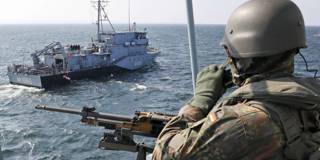Although the EU has one of the world's strongest arms-export frameworks, the rules are not enforced. If Europe is to have any chance of deepening defense cooperation, let alone creating a defense union, that must change.
BERLIN – Earlier this year, Germany decided – over the objections of France and the United Kingdom – to extend its arms embargo against Saudi Arabia, reflecting concerns about the legality of the Saudi-led military intervention in Yemen. The dispute highlights the discord and inefficiency that still plague European arms-export policy. And failure to address it is severely undermining the European Union’s efforts to raise its defense profile.
Initiatives like the European Defense Fund – which seeks to coordinate, supplement, and amplify national defense investments – have been hailed as silver bullets for Europe’s defense-capability problem. But, as Anne-Marie Descôtes, France’s ambassador to Germany, has pointed out, if European governments are to develop military equipment jointly, they have to be able to rely on their partners to export the necessary components. That requires a transparent and predictable set of export rules.
As my co-author, Beth Oppenheim, and I set out in our Centre for European Reform research paper, “Up in arms: warring over Europe’s arms export regime,” weapons exports can facilitate defense cooperation with allies by improving interoperability. In some cases, they can also be used to raise the defense capabilities of strategic partners, bolstering efforts to address globally significant security challenges, such as piracy or terrorism. At home, exports to third countries allow European defense companies to make the most of economies of scale, while forcing them to produce more competitive products. The more countries that are involved in these exchanges, the bigger the impact.

BERLIN – Earlier this year, Germany decided – over the objections of France and the United Kingdom – to extend its arms embargo against Saudi Arabia, reflecting concerns about the legality of the Saudi-led military intervention in Yemen. The dispute highlights the discord and inefficiency that still plague European arms-export policy. And failure to address it is severely undermining the European Union’s efforts to raise its defense profile.
Initiatives like the European Defense Fund – which seeks to coordinate, supplement, and amplify national defense investments – have been hailed as silver bullets for Europe’s defense-capability problem. But, as Anne-Marie Descôtes, France’s ambassador to Germany, has pointed out, if European governments are to develop military equipment jointly, they have to be able to rely on their partners to export the necessary components. That requires a transparent and predictable set of export rules.
As my co-author, Beth Oppenheim, and I set out in our Centre for European Reform research paper, “Up in arms: warring over Europe’s arms export regime,” weapons exports can facilitate defense cooperation with allies by improving interoperability. In some cases, they can also be used to raise the defense capabilities of strategic partners, bolstering efforts to address globally significant security challenges, such as piracy or terrorism. At home, exports to third countries allow European defense companies to make the most of economies of scale, while forcing them to produce more competitive products. The more countries that are involved in these exchanges, the bigger the impact.